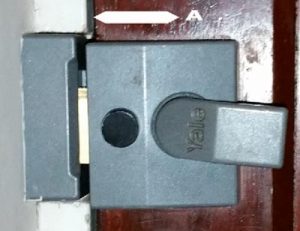Locksmiths Top Tips For Locks and Security
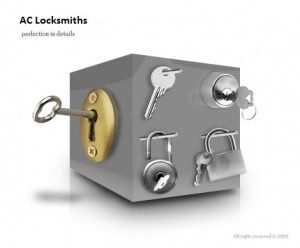
1. Instead of leaving a key in your back door, take a back door key with you when you leave the house. Almost every time I attend an emergency where my customers have lost their keys, they show me the back door with the key in the other side. Carrying a key for the back door in a separate pocket to your front door key gives you a greater chance of being able to get in without waiting for a locksmith. It is also better for security because all the time a key is in your back door, a burglar can break in through a window and easily carry stuff out of your house through that back door!
Leaving keys in doors is good fire safety practice while people are in the property, but they should be removed from locks if the property is empty.
2. Oil your locks regularly – at least twice a year. The best way to remember is to do it every time you change your clocks, w
This is especially important if you live near the sea. Don’t just spray where the key goes in. Most locks have a latch that retracts when you pull the handle down, when the latch retracts, the wedge makes a gap for your oil or silicone spray. Spray for around 5 seconds to get plenty inside, then turn the key a few times to make sure the lubricant reaches all parts. If you have a locking mechanism with lift up handles, works the handles up and down a few times, but make sure you lubricate all moving parts (bolts, hooks, rollers, etc.)
3. Do not put your override keys to your safe inside the safe. Equally, do not leave the override keys anywhere in your property. A burglar can find those keys and get to your valuables. They will know the hiding places you think are sneaky.
Safe keys should be with a trusted friend or family member in an entirely separate property. Also, do not wait for the batteries to get low. Change them annually whether they need it or not. Always consult a security expert before buying a safe because they can advise you on the pitfalls many are trapped by. There is nothing worse than needing your passport from a safe you cannot access and finding out the safe expert cannot get to you for two days by which time, your plane has departed!
4. Please stop posting on social media all about your holiday whilst away. Your friends probably don’t care as much as you would like to think, but the burglar is very thankful you are advertising that your property is empty. Don’t ruin your holiday by coming back to find all your valuables have been taken. You can post your holiday highlights when you get back.
5. When you get extra keys cut, use the originals most. Badly cut keys ruin locks. Key cutters use generic key blanks made from cheaper metals. If you buy your locks from a locksmith, they can order branded keys made for the lock cut from superior metal. These will then be covered by guarantee. Once you use a poorly cut off brand key, and it damages the lock, you invalidate any guarantee given by your locksmith. So if you must get spares made, try to use the originals the most.
6. Be wary if you have a family member who suffers with dementia. This is a sensitive subject but I have experience of a good number of customers coming back to me because they have lost their keys. The excuses are often the same, with angry accusations at neighbours or carers who have ‘let themselves in and stolen my keys again.’ The last thing a locksmith wants is to take advantage of anyone with this awful condition, but we cannot change locks for free. We also cannot ask the customer for phone numbers of family members because it is not right to do so.
If your loved ones are getting forgetful and you notice new locks, firstly try and get a key for yourself. Then, see if you can find out which locksmith they used. I would be more than happy if you called me to say you are MR X’s son/daughter and that if Mr X should call me in a muddle, I should try and call you before setting off to change the lock again. Mr X will be far happier having you search for the key he has hidden and forgotten than me. I would expect any decent locksmith would feel the same.
7. Next to your mobile phone, your lock and keys are the things you use the most almost – every day for that majority of us. Treat them accordingly. When I take handles off of doors, I find a variety of spider carcasses, wasp larvae, rust and other muck. While unscrewing and re-screwing the fixings too many times is not good for the wood, occasional cleans behind the handles is not a bad idea. You might well discover broken springs and other nasties that need seeing to. Better to catch things early before they fail completely and you find yourself unable to get in.
Likewise, I have come across many a door where someone has simply painted over the lock while decorating. It doesn’t take many seconds to undo the screws and remove the lock while painting and even less to put a bit of masking tape over the area. Painting over the lock is not good. At best, the screws fill with paint and when you do need to take the lock out because it has failed, you cannot undo the clogged screws without extra effort. Locks might not be as exciting as a phone, but they are more important.
8. Do not leave keys on a flat surface or hanging up anywhere in the vicinity of a door with a letter plate, especially if you have windows through which the keys can be seen. If I can put a mirror through your letter plate and see your keys, I can retrieve them, which means a burglar can do the same. A letter cage on the back of your door is amazing security, especially if you have a thumb turn rather than key operation on the inside. Better still, seal your letter plate and invest in a separate post box to fit externally.
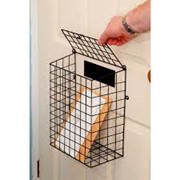

If you have any questions about the above content or any else security related, please feel free to contact me.
See my customer testimonials here
Thanks for reading
Lock changes for landlords
If you own a holiday let property, you should be well aware of the new fire regulations that suddenly hit last summer. I know many of you have been spending all your profits to ensure your properties are up to scratch for the coming season.
But what about long term lets?
The fire risk assessment to be carried out by holiday let owners states; ‘any property you pay to stay in. ‘If that doesn’t already mean long term lets, then it certainly will if the government of the day decides that the measures taking place with holiday lets are a success. After all, the more they make you spend, the more they get in tax.
If you own properties that you let out to tenants, then it might be an idea to get ahead of the curve. Lock changes for landlords; locks are changed all the time through abuse, lost keys, evicted tenants etc. What better time than now to make sure that the new locks going in are keyless escape versions. In the event of a fire, your tenants can get out quickly without having to find keys in a panic situation?
AC Locksmiths Norfolk can change your locks for you. Replacements are kite marked products. All insurances will be valid.
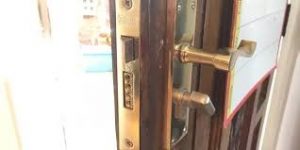
But while thumb turn (escape) locks are great for getting out easily, they can be a reduction in your security. There are tools that can go in through letterboxes and rotate the inner thumb turns, it is important to consider options to cancel this short fall. Letter catching cages are a great remedy to this, or mounting a post box outside your house, while disabling any door positioned letter plates is even better.

Changes are coming. I have spoken to several holiday let owners who have changed locks recently, only to have to change them again in light of the new legislation. It’s worth thinking about being ready for the inevitable.
Any questions regarding the above, please do not hesitate to contact me through any of my contact methods. https://www.ac-locksmiths-norfolk.co.uk/contact-us-here/
Thanks for reading.
It is well known that business properties, especially where the public has access, should have secure fire exit doors, which means that all locked doors should be able to be opened from the inside without a key.
But many people renting out properties for holidays do not realise that these fire exits should have easy escape capabilities. The logic behind this is that if the lock is key operated on the inside, the customers may well lock the door, put the key somewhere safe, and then should the worst happen and a fire break out, in their panic and being away from home, they could well forget where they have put the key and be caught in a tragic accident.
So if your wooden door has a nightlatch (often called a ‘Yale’ lock), and that lock has a British Standard Kite mark, you are fine.
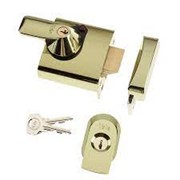
If your wooden door has a mortice (often called a ‘Chubb’ lock), with key operation on both sides, there is a conversion that can be done to use a Euro Cylinder that has a thumb turn on the inside. This means changing the lock and handles but can use the existing space with minimal visible change.
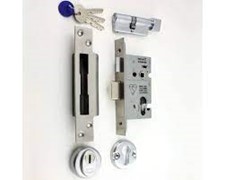
If your door is UPVC or has any mechanism where the handles must be lifted before locking, it is a simple matter of swapping the existing Euro Cylinder for one with a thumb turn on the inside.
This is a key both sides Euro Cylinder: 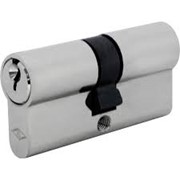
And this is a standard thumb turn Euro Cylinder: 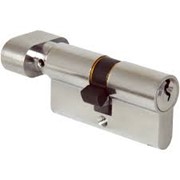
There is a slight worry with installing these fire escape systems, though and that is I have a tool that can go in through letter boxes and turn the thumb turn allowing me access to the property. We have two solutions. Firstly, certain thumb turns on the very best cylinders are designed to be difficult for tools to turn. They might require a push while turning or just plain difficult for the tool to purchase.
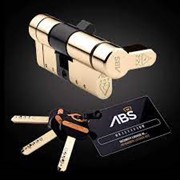
Alternatively, you can buy specially designed sloped guards for your letterbox (although even these can be bypassed with ever more clever locksmith tools).
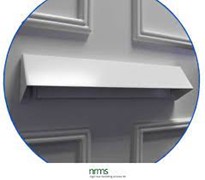
Or better yet a letter catching cage on the back of your door will stop all tools that I know of at time of writing.

If you own or run holiday lets, you might find your public liability insurance does not pay out if you have not taken the correct measures to ensure the safety of your guests.
I am noticing a lot of village halls are also suddenly finding out from fire inspections that they are not up to scratch. Please check the regulations specific to you if you run any property that is not a private home.
Click here for Government guidance on fire doors/fire safety
Should you have any questions regarding the above information, please do not hesitate to contact me.
Thanks for reading.
Common key & lock mistakes – And How To Avoid Them
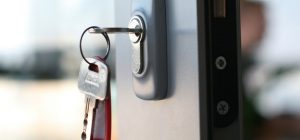
It has been a while since I have produced a blog helping you to avoid needing to call out people like me. So here is a short list of common, avoidable mistakes people make that might just help you not make those same mistakes, hopefully saving you time and money.
Safe Keys
Putting override keys inside your battery operated safe: Safes are great, but if you have a key operated safe, the safe is only as good as the place you hide the key. People are quite obvious in hiding places, so digital safes are a lot better then simple key turn safes. The only problem is that digital safes have master key overrides and the safest place for these keys is in the safe itself. But if you only use your safe rarely there is a good chance you will forget about it, It gets placed in a built in cupboard, covered in clothes and out of sight, out of mind. The batteries start to die and because it is covered in clothes, you don’t hear the warning beep and pretty soon, you have a keypad that you cannot use. Thankfully, you have override keys…. But they are inside the safe. At this point, you can call a domestic locksmith who will gain access by destroying your safe and you will have to pay him for the privilege. You then have to buy a new safe. Potentially £100s because you forgot to change the batteries and left the override keys inside the safe. You can try a safe specialist to come and pick the lock, but the cost might still be £100s because safe specialists are rare (the courses and equipment are expensive) and they don’t get many calls compared to standard locksmiths.
How to avoid disaster? Firstly, take those override keys and trust a family member/good friend to look after them for you. If their house gets broken into and a burglar finds your safe keys, they have no idea what safe they open or where it is. But if they find those keys in your house, they can get into your safe. So, get those keys away from your property. Surprisingly, now your keys are not easily accessible in your safe, you will be more likely to check your batteries! But don’t rely on that. Check how long your safe manufacturer says batteries should last and halve it. Write on the calendar when to change the batteries. Use the old batteries for something else, but keep new batteries in your safe. I love Autumn and Spring because we change our clocks and this gives us a great time to do other things like regular battery changes. Have a list of other maintenance things to do like pre-winter gutter cleaning, etc, and put safe battery changes on that list. This will ensure that if you do have to call someone to open your safe, it will be because something has gone wrong rather than having to explain an expensive memory failure.
Car keys on holiday
I wish I had a sum of money for every time someone called me to say they lost their keys on the beach and the spare car key is 400 miles away on the other side of the country… Oh wait, I do! When you drive somewhere on holiday, take your spare key. When you get to your hotel/air B&B/caravan, etc leave your key somewhere safe at your destination. If you lose your car key, it will be a lot cheaper to get a bus/cab back to your holiday base than it will to call an auto locksmith to come and make a new key on the spot for you. A lot quicker too. Even when you go out on a normal day, if you have someone with you, get them to carry the spare key. If you bring the spare out and leave it in the glove box, you are making life difficult for everyone except car thieves.
Letter boxes
Sticking with cars, most cars are stolen from driveways or outside homes using the keys which have been lifted – either because the front door is left unlocked, or the thief has fished the keys through the letter box. Tools for opening locked doors via the letterbox are getting cheaper, easier to use, and ever more sophisticated. Even if you have an angled guard, there is a tool that goes around it. You might think this is a step back to your Grandma’s house, but a letter basket with closing lid, is a great way to foil the letterbox thief. Better still, seal up the letterbox, and have an external box. If you have room, get one that is big enough for parcels, We get so much delivered these days, a lockable parcel box is a great idea. At the same time, door cams record anyone approaching your door and will have images sent to your phone before they can vandalize it. But I digress..
Copy keys
If you are renting out a holiday home or have multiple carers, etc, get a locksmith to install a new lock, with all new, branded additional keys tried and tested before the lock goes in. Almost every time I get called back to job where the lock has failed, the customer shows me a key that has been copied elsewhere on some poor-quality blank. If you get keys copied and they foul up the lock, that is invalidating any guarantee the locksmith gives you, but if you are using additional keys supplied with the lock at time of installation, you are completely covered. But, if you must get copies made, make sure the original keys are the ones that get used most. I.E. let the guests use them. Yes, they might lose them (less likely if you request a deposit), but if they have poor quality keys and the lock fails and they are locked out waiting for a locksmith who destroys the lock getting in, the cost just multiplies. If you need multiple carers, please get a keysafe. It is better than having to collect keys later and ensures better keys are used.
5 lever locks
Know your terminology; there is a difference between a five lever mortice lock and a multipoint locking system. If you have a wooden door the mortice lock, (often called a ‘Chubb’ lock) is the one that should be 5 levers. If you look at the front plate, It will tell you that it is either 2, 3 5 levers and preferably will display a British Standard kite mark that tells you it has been tested against picking, drilling, sawing and most other forms of attack. If you have a door where you lift the handle and various hooks/bolts/mushrooms, etc. move, this is not a five lever lock. This is a multi-point locking system and your insurance is happy with that, which is bizarre because these systems are only as good as the locking barrel you put your key into and insurance companies are yet to wake up to how easy these can be to bypass. Again, digressing, but please talk to your local locksmith about kite-marked barrels. And if your architect/builder/designer tries to tell you these new multi-point doors without handles are a good idea, ignore them. When there is no handle, all the force of opening the door goes through the key. The leverage ratio is tiny compared doors with nice big handles, and at some point, you will snap your key in your lock.
Complacency
My last one for this blog; Just the other day, I fixed a basic lock on the top half of a stable door. It was not insurance compliant. When I challenged the customer regarding this and told him that his insurance company would not pay out if he were burgled, he replied with one I have heard often: ‘This is Norfolk. Although I know someone in the next village got burgled and lost a lot, it’s highly unlikely I will.’ So why pay for insurance at all? If you are paying for insurance, you owe it to yourself to make sure you are compliant. A second house this week is having three locks replaced after one has stopped working. I pointed out the three locks were all 3 lever and not insurance compliant, so the customer in this case, ordered new locks without delay. If you have an older house, don’t just assume the locks are up to spec. Most decent locksmiths do a free security check and, speaking for myself, when I do security checks I will tell you where advice is necessary and where advice is just personal recommendation.
This article about insurance required locks is quite good.
Should you have any questions regarding the above, please get in touch.
Thanks for reading













